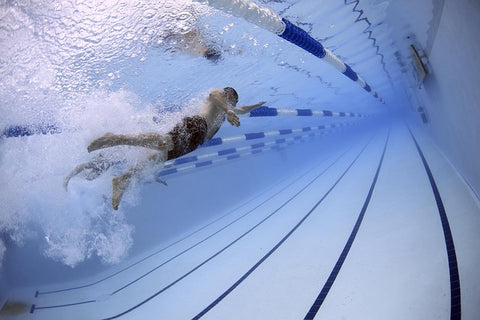
Secure Your Swim: 8 Essential Tips for a Safe and Happy Pool Experience
Swimming is not just a refreshing way to cool off during the hot summer months, but it's also a joyous activity that brings families and friends together. However, amid the laughter and splashes, safety should always be the foremost priority. Whether you're a parent supervising a playful weekend or an individual seeking serene laps, ensuring a danger-free pool experience is crucial. These tips are designed to protect not just the swimmers but also the peace of mind of everyone around the pool, making every dip enjoyable and worry-free.

Pool Safety Equipment
To further enhance safety around your pool, investing in the right equipment is a smart move. Some essential items include pool fences, alarms, and covers. Pool fences act as a barrier to prevent unsupervised entry to the pool area, while alarms alert you when someone enters the pool without your knowledge. Meanwhile, covers keep the water clean and reduce the risk of accidents by preventing accidental falls into the pool.
Safety Guidelines
When it comes to children and pools, a watchful eye is essential at all times. Even if your child knows how to swim, it's crucial to never leave them unattended in or near the pool. Additionally, teaching them basic swimming skills and water safety rules at an early age can greatly reduce the risk of accidents. For adults, avoid swimming alone or drinking alcohol before taking a dip. Always follow the posted pool rules and never dive into shallow water.
Personal Floatation Devices
Equipping swimmers, especially children and non-swimmers, with personal floatation devices (PFDs) is an effective measure to enhance safety in and around the pool. It's important to choose PFDs that are appropriate for the swimmer's size and weight to ensure they provide the right level of buoyancy and fit securely. While PFDs are a critical safety tool, they do not replace the need for constant supervision. In addition to standard life vests, consider arm floaties for children as an additional aid, but always ensure that any floatation device used is approved by recognized safety standards organizations.
Sun Protection
While enjoying the pool, it's also important to protect yourself and your loved ones from the harmful effects of the sun. Extended exposure to ultraviolet (UV) rays can lead to sunburn, premature aging of the skin, and increase the risk of skin cancer. To minimize these risks, apply a broad-spectrum sunscreen with a high SPF (sun protection factor) that is water-resistant.
Reapply sunscreen every two hours, or more often if you're sweating or swimming. Additionally, consider wearing sun-protective clothing, such as long-sleeved swimsuits and hats, and seek shade during peak sun hours, typically between 10 a.m. and 4 p.m. Sun protection is crucial for everyone, regardless of age, skin type, or swimming proficiency.
Hydration and Snacks
While the focus is often on the swimming itself, staying hydrated and nourished is equally important for a safe and enjoyable pool experience. Swimming and playing in the sun can quickly dehydrate the body, making it crucial to drink plenty of water before, during, and after pool activities. Avoid beverages with caffeine or large amounts of sugar, as they can contribute to dehydration.
For longer pool days, having a selection of healthy snacks on hand can keep energy levels up and prevent hunger-related crankiness in both kids and adults. Opt for light, easily digestible snacks like fruits, vegetables, nuts, or whole-grain crackers. These snacks can help maintain stamina without feeling heavy or causing discomfort during swimming. Always have a cooler or shaded area to store perishable items to ensure they stay fresh throughout the day.
Preventing Diving Accidents
One of the most common causes of pool-related injuries involves improper diving techniques and choosing unsafe diving areas. To prevent accidents and ensure the safety of all swimmers, it's crucial to establish clear rules around diving. First and foremost, only allow diving in designated areas that are marked and have been verified to be deep enough for safe entry. It's important to enforce a strict 'no diving' policy in shallow areas of the pool, as shallow water dives can lead to serious head, neck, and spinal injuries.
Educating all pool users about the dangers associated with improper diving is also key. Offer guidance on proper diving techniques and consider placing signs around the pool as reminders. For those new to diving, or younger swimmers, providing lessons from a qualified instructor can be invaluable.
Knowing Emergency Procedures
Familiarizing yourself and your family with emergency procedures is a critical aspect of pool safety. In the event of an accident or emergency, a quick and informed response can be lifesaving. Ensure that emergency contact numbers are easily accessible, and consider having a phone nearby the pool area specifically for emergency calls. It's beneficial for at least one family member or regular pool user to be trained in CPR (Cardiopulmonary Resuscitation) and basic first aid. Additionally, keep a well-stocked first aid kit close to the pool area, making sure it includes waterproof bandages, antiseptic wipes, and any other essentials specific to your family’s needs.

Poolside Etiquette
Good manners extend beyond the dinner table and into the pool area, ensuring everyone has an enjoyable time. One of the golden rules of poolside etiquette is keeping noise to a minimum to not disturb other swimmers or neighbors. Remember, what’s fun for you might be disruptive to someone else seeking relaxation by the pool. Additionally, it’s important to be mindful of the space you occupy. Don’t spread out your belongings more than necessary, and always clean up after yourself to maintain a tidy environment.
Practicing good hygiene is paramount. Always shower before entering the pool to rinse off any lotions, oils, or sweat that could contaminate the water. It's equally important to avoid swimming when you're ill, particularly with gastrointestinal issues, to prevent spreading germs. Also, to maintain the pool’s cleanliness and ensure safety, make sure to use the restroom facilities and not the pool.
Lastly, respect for privacy and common courtesy should guide interactions around the pool. This means not engaging in PDA (Public Displays of Affection) that might make others uncomfortable and ensuring your actions do not invade another’s personal space or interfere with their enjoyment of the pool. Following these simple yet significant etiquette rules can contribute to a harmonious and enjoyable pool experience for everyone.
Swimming is not just an enjoyable activity but can also be a safe one with proper precautions and practices. By implementing these essential tips, you can ensure the safety of yourself and others while enjoying all that the pool has to offer.
Leave a comment
Comments will be approved before showing up.



